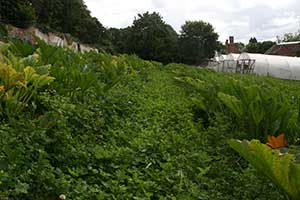
As part of the SOLIBAM project, a small-scale low-input organic market garden and box scheme was assessed and compared to two modelled organic vegetable and food supply systems embedded in a supermarket distribution system. Emergy accounting and Life Cycle Assessment (LCA) were used to measure resource use and the environmental impact of the contrasting systems. The distribution phase of the box scheme was at least three times as resource efficient as the modelled systems and had substantially less environmental impacts when assessed using LCA. The three systems ranked differently for emissions with the high-yielding model system being the worst for terrestrial ecotoxicity and the market garden system the worst for global warming potential.
Markussen MV, Kulak M, Smith LG, Nemecek T, Østergård H. Evaluating the Sustainability of a Small-Scale Low-Input Organic Vegetable Supply System in the United Kingdom. Sustainability. 2014; 6(4):1913-1945.
More information here
